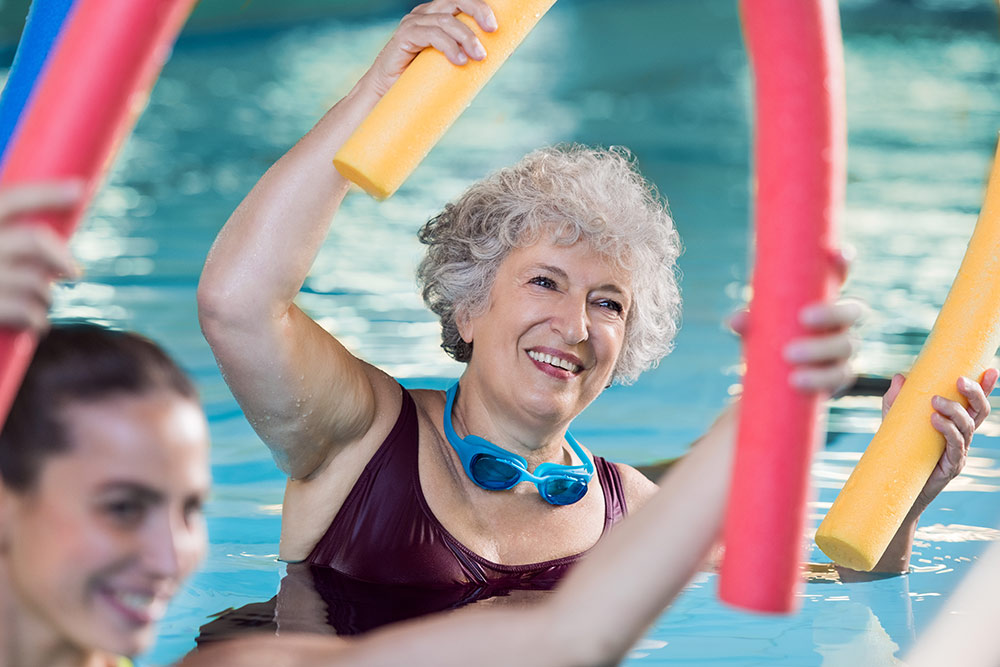Most elderlies residing in senior living in Oceanside engage in regular physical activity for good reasons. The biggest reasons include managing their diabetes and trying to achieve a healthy weight. But did you know that regular exercise also has a tremendous impact on your brain and mental well-being?
Working out may be a physical kind of activity, but its benefits do not stop at the physical level. According to Harvard Health, regular exercise helps stimulate your brain’s mental faculties.
Further, it protects your memory, reduces your chances of developing a mental health illness, and can even help seniors with Alzheimer’s disease.
Health experts recommend seniors exercise at least 10 to 15 minutes daily. Even a 10-minute low-impact aerobic workout can do tons of benefits to your mental health as long as it’s done regularly.
So, start donning your running shoes and workout clothes to reap all these benefits. Some of the best advantages of exercising include:

1. Keeps the Brain Active and Sharp
Over time, physical activity has the power to keep your brain sharp and independent well into your 80s or 90s. Even if you just started getting into the fitness groove, you can still gain the long-term positive effects of exercise, such as:
- Production of new brain cells to replace old ones.
- Slowing down the brain’s age-related decline.
- Strengthening the brain’s functions like thinking, memory, concentration, creativity, and speech.
- Long-term survival of healthy cells.
These result from more blood, nutrients, and oxygen circulating in the brain due to exercise. This also increases the hippocampus’ size, thus enhancing learning and memory skills.
Further, physical activity stimulates the release of growth hormones that enables the brain to produce new and healthy brain cells.
So get up and moving if you want to tone the most important “muscles” in your body—the brain!
2. Prevents Brain Disorders
Several studies showed that regular physical activity greatly decreases your risk of developing brain disorders by 50 percent. Moreover, it protects you from Alzheimer’s disease and dementia by increasing the flow of nutrients in the brain, allowing the brain cells to maintain a connection with each other.
Increasing the brain’s ratio of nutrients also slows down the decline of your cognitive function, particularly your memory. Make the most out of the benefits of exercise by pairing it with other healthy activities, like:
- Eating a healthy diet.
- Avoiding smoking and limiting alcohol consumption.
- Sleeping eight hours every night.
- Getting regularly checked by a doctor.
Continue these behaviors, and you will extend your life for another ten to twenty years while residing in the best senior living in Oceanside.
3. Aids Seniors with Alzheimer’s Disease
Besides preventing brain disorders, exercise also helps seniors manage the symptoms of their Alzheimer’s disease.
It helps maintain their weight, keep their muscles toned, and their bones strong. Plus, it also helps them ward off other diseases like diabetes and hypertension.
Generally, exercise makes seniors with Alzehimer’s feel good about themselves while controlling their symptoms. In fact, studies showed that elderlies who do aerobic workouts are less likely to wander, get agitated, and exhibit sundowning.
Introduce regular physical activity to your loved one’s routine by:
- Making it more fun by joining in their morning workout sessions.
- Start with mild mini-workouts that last for 10 to 15 minutes. Then gradually increase it weekly according to their fitness level.
- Stick with simple routines with easy steps.
- Ask them if they want to exercise with one of their favorite bop songs in the background.
- Wear comfortable clothes and sensible shoes.
- Always keep them hydrated throughout the workout.
It would be best to consult your senior loved one’s doctor first before starting any fitness programs.
4. Improves Sleep Quality
Exercise may be physical activity, but it actually helps relax your mind at night and achieve quality sleep.
Studies found that exercising directly improves your sleep quality by reducing the time it takes to fall asleep at night. Further, morning workouts keep you awake for the better part of the day; then help cool down the body at night for better sleep.
Indirectly, exercise allows you to rest fully at night by taking away your stress. They can do this by stimulating the release of endorphins—a hormone that relieves stress and pain while boosting your mood.
If you are having difficulty trying to get a good night’s sleep, try putting in a few hours at the fitness center during the mornings.
5. Reduces Stress
After a tiring day you spent in the senior living in Oceanside, the last thing you want to do the next day is exercise, right? However, health experts say that physical activity, no matter what form, can actually help you manage stress.
In a way, regularly exercising helps you build resilience against the mental stresses of life. Also, it boosts your physical and psychological well-being, allowing you to manage stress effectively.
Yoga, swimming, or jogging—any form of physical activity can help reduce your stress as long as it gets the body moving while you’re enjoying what you are doing.
6. Blocks Mental Health Problems
Stimulating your brain with exercise allows you to reduce your risks of developing mental problems in the long run. Studies show that physically active seniors have more chances of avoiding depression and anxiety than elderlies who spend most of their time on the couch.
This is because exercise promotes the production of new cells in the brain, making it more resilient against illnesses. In addition, working out energizes your mental physique, improves overall mood, and distracts you from the constant cycle of depressive thoughts.
Besides depression and anxiety, it can also help prevent other mental disorders, such as:
- ADHD or attention deficit hyperactivity disorder
- PTSD or post-traumatic stress disorder
- Emotional trauma
- Chronic stress
In fact, many counselors recommend exercise to seniors suffering from mental problems. It is also included in most of their treatment plans together with counseling therapy and medications.
The best senior living in Oceanside should also include exercise as part of their senior community’s daily activities.

